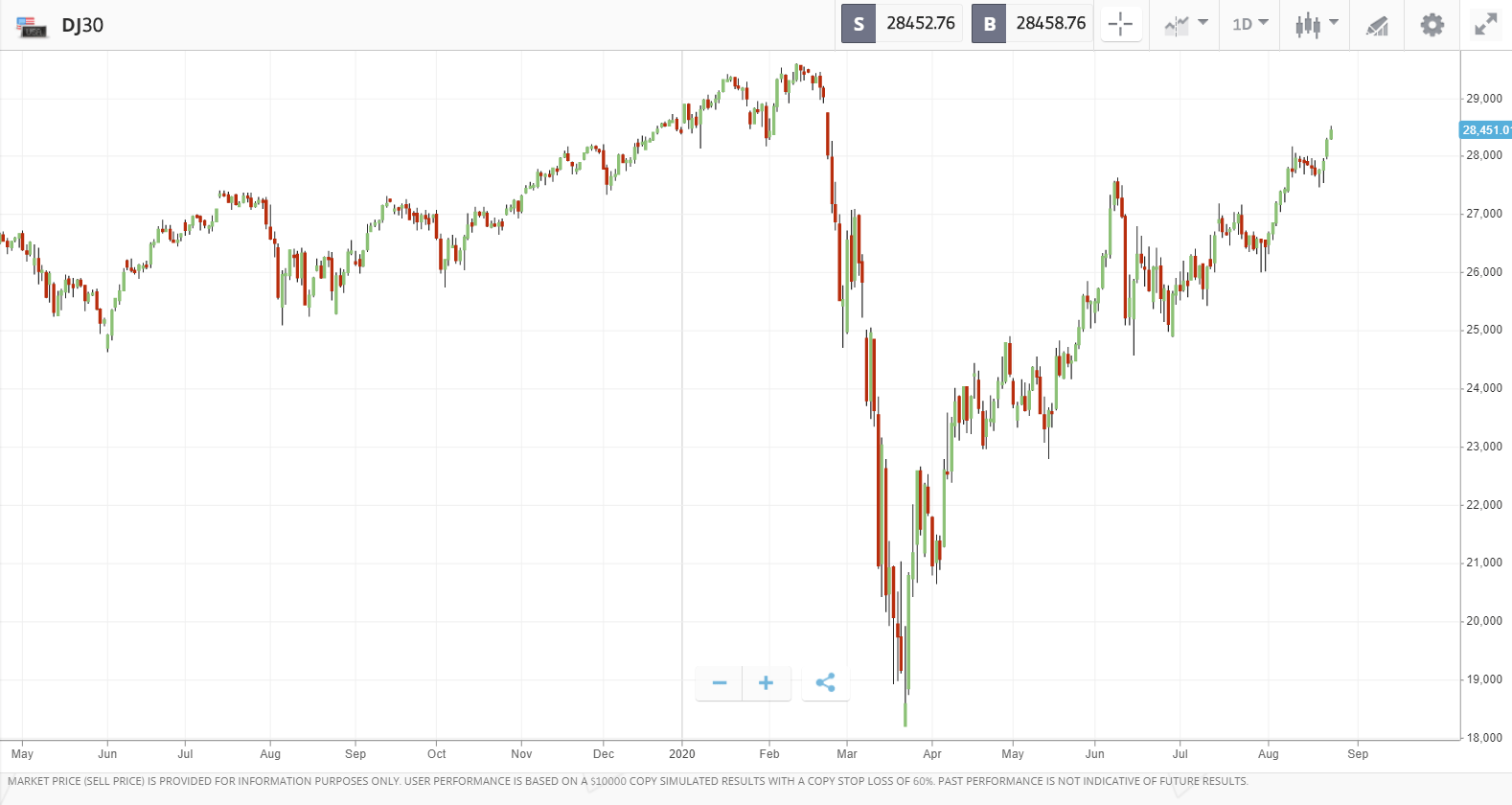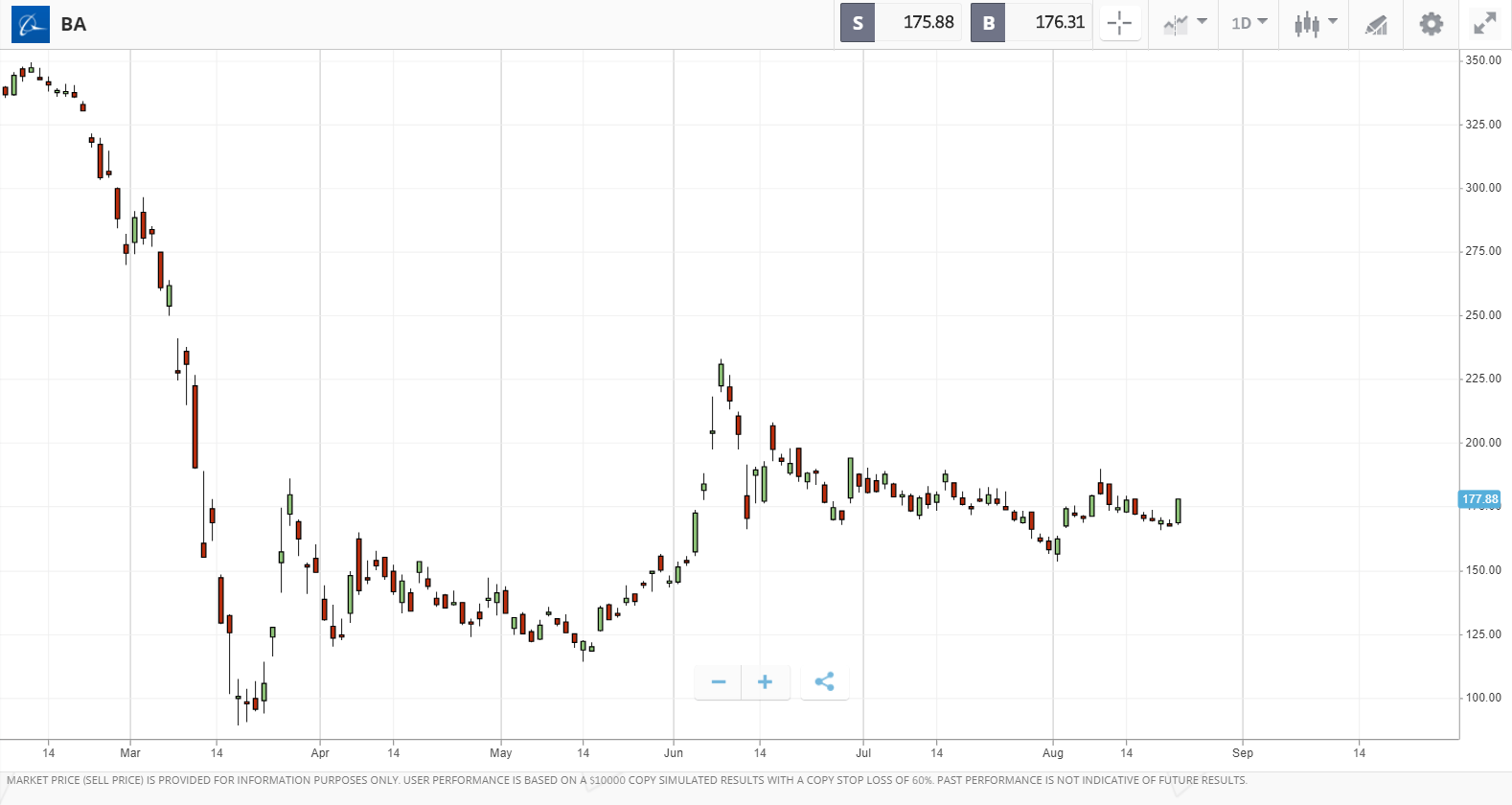One of the world’s major stock indices is set to undergo some significant changes, with Exxon Mobil, defense firm Raytheon Technologies and drug maker Pfizer on the way out of the 30-name index of US blue chip stocks. The trio will be replaced by cloud business software provider Salesforce, and conglomerate Honeywell. Apple’s four-to-one stock split is one reason the changes are being made, as the index is constructed based on share price rather than market cap, so the change would have dramatically cut the Dow’s technology exposure. The news broke as the Dow came within touching distance of breaking even in 2020, after adding 1.4% on Monday. Currently, the Dow is down just 0.8% year-to-date.

In merger and acquisition news, a potential deal for TikTok’s US operations once again hit headlines, after its parent company ByteDance announced it is suing the US government over an executive order from President Trump that would ban its US operations on 15 September for national security reasons – unless the firm reaches a deal to sell to an American company. The Wall Street Journal also reports that two major investors in TikTok’s parent company are helping to drive a bid by a group including Oracle, which recently threw its hat into the ring. General Atlantic and Sequoia Capital reportedly grew concerned about not having a place in a Microsoft deal for TikTok, so found their own tech partner.
Energy and airline stocks soar on Covid-19 vaccine news
All three US indices started the week on a positive note, with the S&P 500 up 1%, taking its year-to-date gain to 6.2%. The energy sector led the way, adding 2.8%, with the energy equipment and services sub-sector up 4.3%. It was airline and travel stocks that topped the index in terms of individual stocks, however, with American Airlines, Carnival and United Airlines adding 10.5%, 10.2% and 9.9% respectively. Delta Air Lines and Norwegian Cruise Lines also both posted significant gains, closing 9.3% and 7.6% higher. The rally was triggered by the weekend news that President Trump may greenlight an experimental Covid-19 vaccine ahead of the November election, which is something airlines need to happen for any form of normalcy to return. Boeing also finished 6.4% higher following the news, as the firm has been on the receiving end of order cancellations with travel demand still suppressed.

S&P 500: +1% Monday, +6.2% YTD
Dow Jones Industrial Average: +1.4% Monday, -0.8% YTD
Nasdaq Composite: +0.6% Monday, +26.8% YTD
BT share price jumps on takeover bid reports
The FTSE 100 enjoyed a strong start to the week adding 1.7%, led by 4% plus gains from BT Group, turnaround specialist Melrose Industries, ITV and Royal Dutch Shell.
BT’s share price jumped after weekend reports that its board is preparing to defend against a £15 billion takeover bid from private equity investors. The firm’s share price is down 44% year-to-date, with its market cap currently sitting just north of £10 billion. Royal Dutch Shell’s share price remains down 50% year-to-date, while rival BP is off 40%. British Airways parent IAG, easyJet and Ryanair were all in the green too, although they did not enjoy the double-digit rallies of some US counterparts.
In the FTSE 250, which added 0.6% yesterday, Oxford Instruments led the way with a 10.6% gain, followed by Cineworld which added 6.8%.
FTSE 100: +1.7% Monday, -19.1% YTD
FTSE 250: +0.6% Monday, -19.2% YTD
What to watch
Salesforce: After the announcement of its impending entry into the Dow, Salesforce stock jumped by around 4% in late trading. The company delivers its Q2 earnings report today, after a year that has seen its share price jump 28.2%, as the cloud software solutions it delivers to businesses have come into their own during the pandemic. Currently, Wall Street analysts overwhelmingly favour a buy rating on the stock, which has been the case consistently for the past three months. Analysts are anticipating an earnings-per-share figure of $0.67.
BestBuy: Following a number of earnings beats from retailers last week, all eyes will be on US electronics retailing giant BestBuy today when it delivers its own Q2 earnings report. Unlike Target, more of what BestBuy sells falls under the category of discretionary spend or luxuries, rather than consumer essentials. Despite that, its share price is up 33.7% year-to-date, as consumers and companies have been buying up tech goods in order to get their home offices up and running during the pandemic. Following the rally, analysts lean towards a hold rating on the stock, although 11 rate it as a buy. Wall Street’s earnings per share expectations for the quarter have jumped by around a third to $1.04 over the past three months.
US consumer confidence: After falling from 98.3 in June to 92.6 in July, August’s US consumer confidence number will be watched closely when it is reported tomorrow. The consensus is for a figure roughly in line with July’s, as continued new Covid-19 cases in many states are hampering the recovery. America’s economy, and markets, are heavily dependent on consumer spending, and a return to form of consumer confidence is a key piece of the world’s largest economy recovering.
Crypto corner: Boston Fed exploring 30 different blockchains for digital currency potential
The Federal Reserve Bank of Boston, one of the 12 banks operating below the central Federal Reserve, is exploring a viable blockchain network to operate a digital dollar, in cooperation with the Massachusetts Institute of Technology’s (MIT) Digital Currency Initiative, according to CoinDesk.
The Boston Fed, which announced its intention to actively test a digital dollar earlier this month, is looking at 30 different blockchain possibilities on which to host the digital dollar.
Boston Fed Senior Vice President Jim Cunha says the bank is looking at issues including scalability, throughput, privacy, resilience and resistance to cyber-attacks. The partnership with MIT was announced last week and the project is still in the early stages of development. The research is focused on technological possibilities rather than potential monetary policy at this stage though.
All data, figures & charts are valid as of 25/08/2020. All trading carries risk. Only risk capital you can afford to lose

